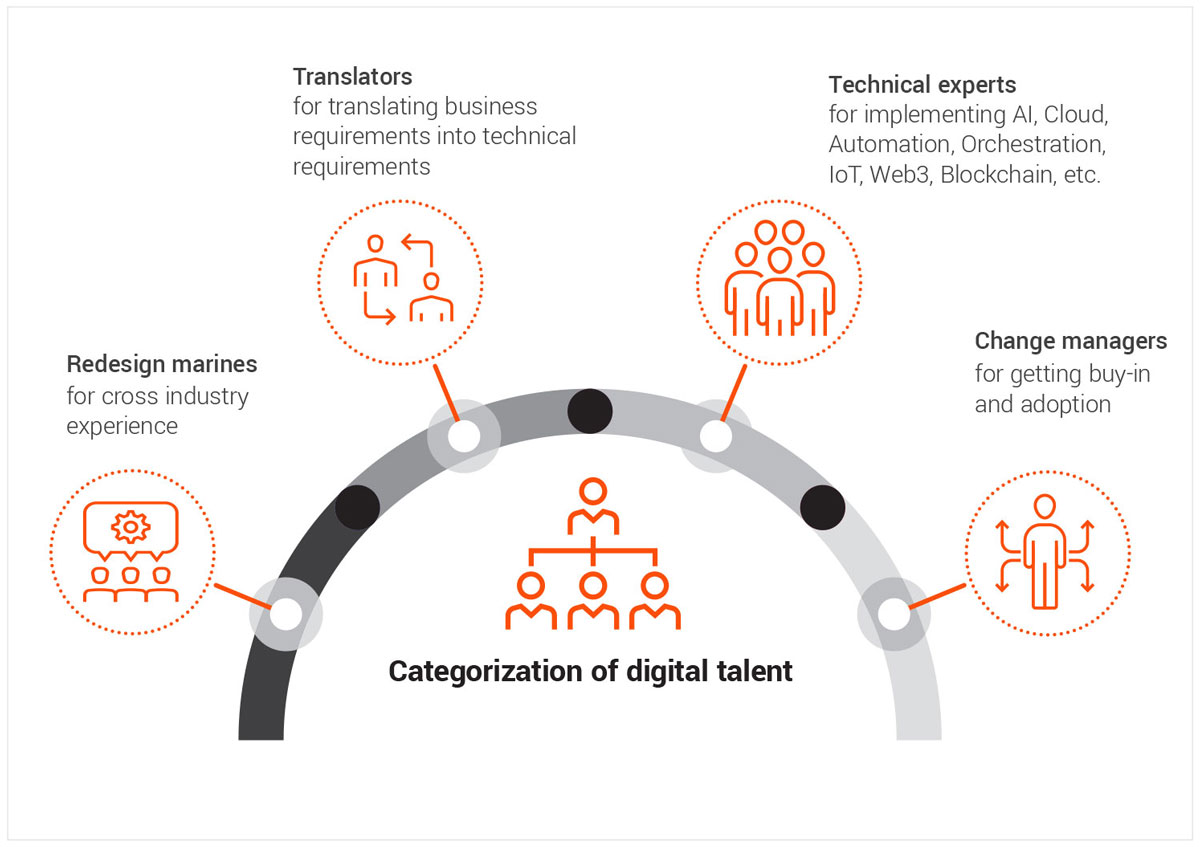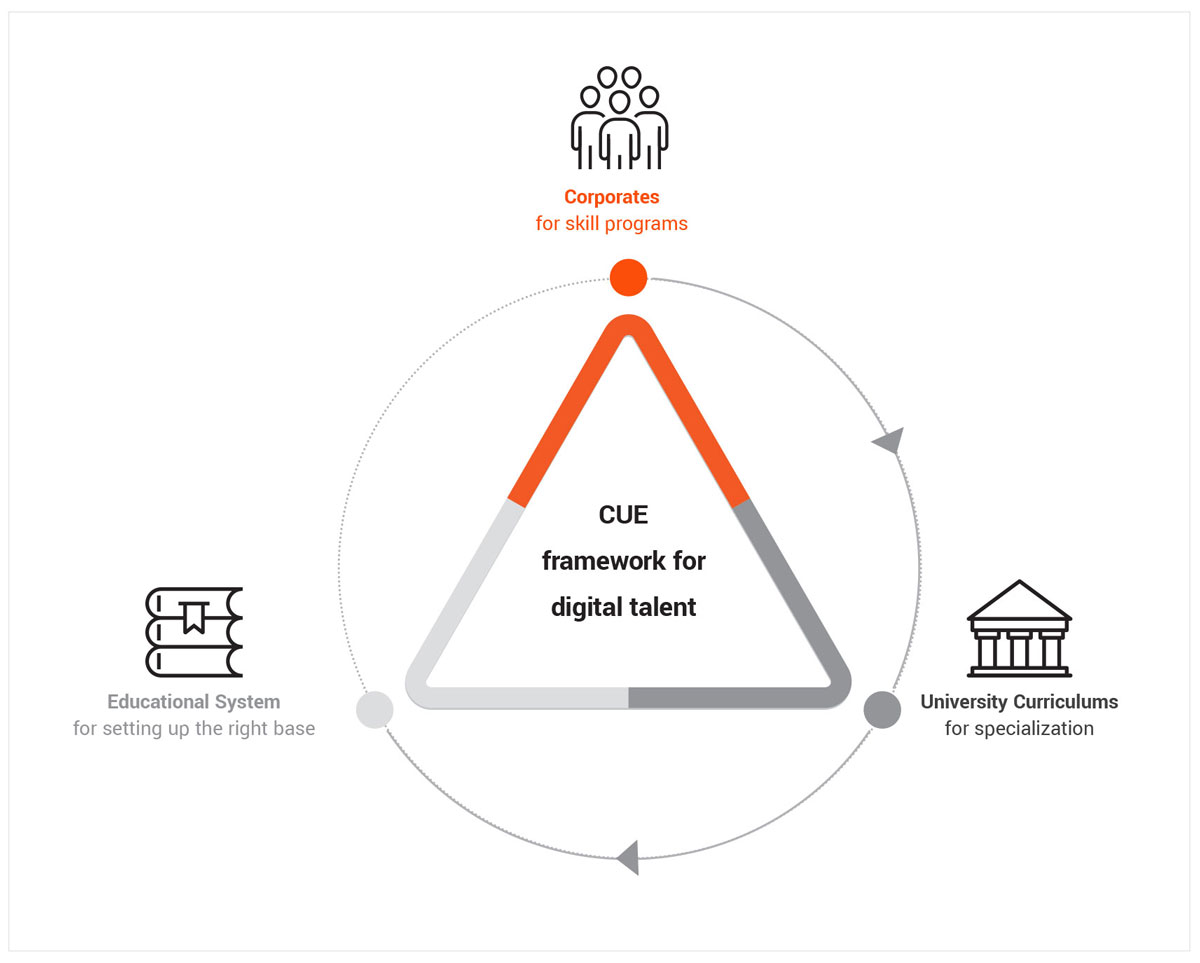Fuel for digital growth – right talent
Many organizations are finding it difficult to scale up their digital initiatives, due to a lack of the right talent. They may have the right people in place for the planning and development stages, but these people often lack the necessary skills and experience to take a project to the next level. This can be a major obstacle for organizations that are trying to grow their digital presence. The good news is that there are many ways to overcome this challenge, from training existing employees to hiring new talent. At EXL, we look at this talent scarcity holistically and share these insights based our research and experience with identifying , training and engaging the right talent.
Why is the demand for digital talent increasing?
The supply of job-ready digital talent is not keeping pace with the demand worldwide. According to research by McKinsey Global Institute1 , one in every 16 workers will need to transition to new roles by 2030 to support an increase in demand for all things digital. In another finding by a research company called MMR2 , the global digital talent acquisition market size is projected to grow at a CAGR of 8.58% and will reach USD 79.6 billion by 2027.
Here are the factors that are contributing to this demand spike for experienced digital talent:
1.This demand for digital talent has been building up steadily over the years. The only difference now is that the global pandemic resulting from COVID-19 has accelerated this demand for tech talent. The pandemic has forced companies to optimize costs and prioritize investments in digital transformation – resulting in an increased demand for skilled people to take on such roles.
2.Consumer behaviors have shifted significantly. The majority of the population is now online, and these new digital consumers expect instant gratification and seamless experiences.
3.The timeline for project completion has shortened drastically, in some cases by many years.
4. The proliferation of digital devices has intertwined our day-to-day lives with smartphones, laptops, tablets, wearables, connected vehicles, and smart homes.
5.Hiring organizations have increased their focus on data and cybersecurity skills, as many employees are working remotely and the incidence of cyber threats have increased. Now that we understand the reasons behind an exponential increase in the demand for people who can create, deploy, and support new technologies, let’s try to analyze this demand across functional areas.
Where is digital talent in the highest demand ?
According to a report by Florida-based DevOps Institute3 , fewer than one-third (29%) of tech companies across the world have the IT talent the need for their businesses. Cognitive, technical, and process skills were in the shortest supply. Another study by Microsoft Data Science4 shows there will be approximately 190 million job openings by 2025 for experts in cloud computing and data analysis, software development, cybersecurity, AI, and machine learning.
Based on EXL’s research, we categorize digital talent demand into the following roles:

1. Redesign Marines
These individuals possess rare crossindustry experience and can dive deep to redesign customer journeys through the customer’s lens. They are adept at optimizing cost by leveraging digital solutions to deliver a solid return on investment.
2. Translators
These individuals function as a bridge between an organization’s business and technical experts by translating business requirements into technical requirements. Such experts have a sound understanding of technology solutions and coding languages, good communication and interpersonal skills, and are experienced in project management.
3. Technical Experts
These individuals drive innovation and improve efficiency by taking advantage of new technologies. Examples of such experts who use digital technologies for solution development are technical architects in AI, automation, cloud and data, developers, technical project managers, and integration specialists. They ensure that business requirements are developed into real-world solutions with the objective of improving customer experience, compliance posture, and operating cost.
4. Change managers
Too often, not enough focus is given to this category, but talented change managers are extremely important for the successful adoption of digital transformation initiatives. They interface with business and technical stakeholders, use collaborative tools and work with clients’ teams on solution adoption.
At EXL, we believe that the above classification will function as an enabler for both talent growth as well as talent acquisition and management. Strategic long-term thinking is needed to address skills deficiencies and optimize talent effectively in the modern workplace. We apply the CUE framework to create an environment that is conducive to learning and provide individuals with training to support digital proficiency.
How does CUE address the digital talent gap?
CUE is a visionary, three-pronged framework EXL uses to nurture critical talent and execute successful digital transformation for our clients. While re-skilling and upskilling existing talent will play a major role in addressing talent scarcity, attracting young talent to fill vacancies is equally important. Therefore, additional investments in education and resources are required to develop a successful digital talent ecosystem.

The CUE framework comprises:
Corporates
Organizations need to have a dynamic digital talent strategy that not only focuses on skills analysis and competency matching but also supports additional training and education programs for employees. It will be a win-win for them and their employees once they start investing in talent transformation with commitment and conviction.
University Curriculumst
Universities can provide an environment to develop employable competencies by better aligning with industry need through greater use of approaches such as apprenticeships, incubators, and boot camps. In a recent survey by careers platform Highered5 , 30% of business school students are apprehensive about their lack of digital skills.
According to research published by Atlantis Press6 on the topic “Advances in Economics, Business and Management Research”, universities can address shortages and mismatches in the demand for advanced digital skills and the supply of suitable employees by:
- Constructing and adopting key strategies towards digital transformation
- Equipping lecturers, students, and staff with modern technological skills
- Building a culture of a strong digital leadership and a legal framework to ensure curriculums deliver quality outputs
Coursera’s Campus Skills Report 20227 highlighted that universities need to constantly update their curriculums , especially in fields related to data and technology.
Universities across the world can stay agile and competitive by delivering cutting-edge human and digital skills.
Educational System
Educational institutions can help students strengthen their understanding of digital skills and how to minimize risks, such as identity theft, bullying, human trafficking, technology addiction, gaming disorder, privacy invasion, and hacking. Such entities can design flexible learning pathways that allow students to combine academic assignments with hands-on experience.
A report by the Organisation for Economic Co-operation and Development (OECD)8 identified that schools still lag behind the promise of technology. A global effort is thus required for an education change at the K-12 level, both in government and private schools. The Future of Education and Skills 2030 project by OECD is believed to enable students to acquire these much needed digital skills.
Conclusion
Today’s jobs are organized by skills. While it is a daunting challenge for organizations and their teams, reskilling existing talent and maintaining a structured framework to develop human capital at the foundational level can be key to bridging the talent gap in the future. Organizations need to design customized, best-of-breed training programs that can close the digital skills gap, increase revenue, reduce costs, and accelerate innovation. The right talent can deliver holistic technology-enabled digital growth.
References
1. The future of work after COVID-19 https://www.mckinsey.com/featured-insights/future-of-work/the-future-of-work-after-covid-19
2. Global Digital Talent Acquisition Market – Industry Analysis and Forecast (2019-2027) – by Skill, by Training Type, by Enterprise Size, by End-User and by Region https://www.maximizemarketresearch.com/market-report/global-digital-talent-acquisition-market/32043/
3. Upskilling must be a global organizational imperative https://www.techrepublic.com/article/upskilling-must-be-a-global-organizational-imperative/
4. Microsoft Data Science study https://msit.powerbi.com/
5. 1 in 3 business school students think they lack the digital skills for jobs in Industry 4.0 https://highered.global/1-in-3-business-school-students-think-they-lack-the-digital-skills-for-jobs-in-industry-4-0/
6. Advances in Economics, Business and Management Research https://www.google.com/url?sa=t&rct=j&q=&esrc=s&source=web&cd=&ved=2ahUKEwjdyZ66uNr5AhWmkNgFHW-HA7UQFnoECAYQA Q&url=https%3A%2F%2Fwww.atlantis-press.com%2Farticle%2F125965410.pdf&usg=AOvVaw0Rp_eU-lunMbAVRM6-HThN
7. Coursera Campus Skills Report 2022 https://www.coursera.org/skills-reports/campus/
8. The Future of Education and Skills. Education 2030 https://www.oecd.org/education/2030/E2030%20Position%20Paper%20(05.04.2018).
Written by:
Sumit Taneja
Senior Vice President,
Transformation & Solutioning
![]()
Rupesh Malik
Manager,
Advanced Digital Capabilities & Solutions
![]()
